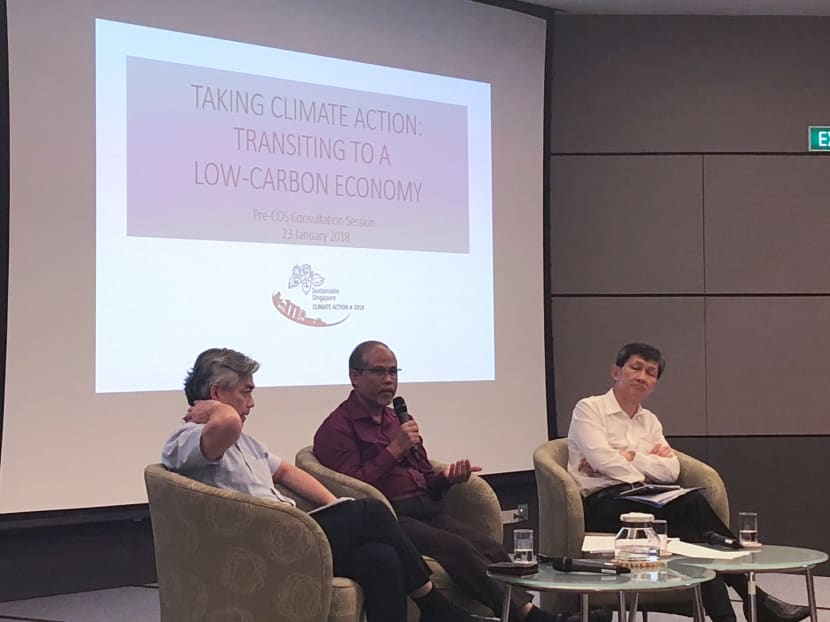Large S'pore emitters call for benchmarks as carbon tax looms
SINGAPORE — As they steel themselves to pay a carbon tax from next year, major greenhouse-gas emitters called for the Government to set emissions benchmarks for each industry at a pre-Budget consultation session on Tuesday (Jan 23).

(Centre) Minister for the Environment and Water Resources Masagos Zulkifli speaking at the pre-Budget consultation session held on Jan 23, 2018. Photo: Louisa Tang/TODAY
SINGAPORE — As they steel themselves to pay a carbon tax from next year, major greenhouse-gas emitters called for the Government to set emissions benchmarks for each industry at a pre-Budget consultation session on Tuesday (Jan 23).
Some of the 44 participants at the session, which included representatives of petrochemical and energy giants, said benchmarks would provide clarity on the standards that large emitters should meet.
Others felt emitters who met the benchmarks should not have to pay a carbon tax, reiterating concerns that Singapore’s push to go low-carbon could hurt its competitiveness.
The tax, first announced in Budget 2017, is expected to apply to 30 to 40 emitters such as power stations that emit 25,000 or more tonnes of greenhouse gases a year. The Government is expected to table the Carbon Pricing Bill in Parliament in the first quarter of this year, and is looking to charge between S$10 and S$20 per tonne of greenhouse gas under a credit-based system.
The carbon tax is among Singapore’s measures to meet its target of cutting emissions intensity by 36 per cent from 2005 levels by 2030, under the global Paris Agreement.
Standard benchmarks will provide clear targets to different industries, which generate different amounts of greenhouse gases, said power generation company PacificLight Power’s chief executive Yu Tat Ming.
His company currently supplies electricity to industries and commercial buildings.
“At the moment, (the power industry) does not know what to do, how much we should reduce in order to achieve the 36 per cent target. We have no visibility on that. Likewise, probably the petrochemical industry want to have a benchmark so that they know how much investment they need to make, to meet the target,” said Mr Yu.
Minister for the Environment and Water Resources Masagos Zulkifli acknowledged the feedback from companies.
“We understand that it will be a difficult transition and the Government will do as much as it can to transition companies towards the low-carbon economy,” he said. “We do need to be competitive but you have to take in the reality where the world is moving, and we better do it as fast as we can to gain competitive advantage over others.”
On whether the Government would consider only taxing companies that exceed benchmarks, Mr Masagos said the authorities have “studied many systems of carbon tax, including whether we should do a trading system or offset system”, and wanted something “simple” and “fair”.
The National Climate Change Secretariat will be announcing its mechanism, said Mr Masagos, without providing further details.
The carbon tax is likely to be passed on to consumers. It could mean a household living in a four-room flat, which pays S$72 a month in electricity bills, could see an increase of S$1.70 to S$3.30 a month. The carbon tax component should be reflected in consumers’ electricity bills, said Mr Yu.
There is a need for more awareness about climate change, Mr Masagos added.
Daily temperatures in Singapore could increase by 1.4°C to 4.6°C by 2100 due to climate change. Heavy rainfall events will be more intense and frequent, while mean sea levels could increase by up to about 1m.
Asked about recent reports that three local banks – DBS Bank, OCBC Bank and United Overseas Bank – were financing coal projects in the region, Mr Masagos would only say the reports indicated a world more attuned to products and services in keeping with a low-carbon economy.
“And whether you are a bank, (generation company) or refinery, this is going to be the demand by an international market. And therefore it’s important for us to make this transition. I think most of the companies that are here recognise this. In fact, many of them have already gone (on) the journey,” he said.
Coal is a major source of greenhouse-gas emissions.








